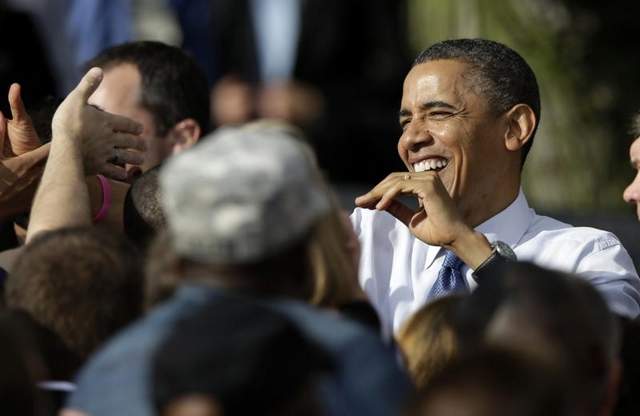Obama Will Win This One

President Barack Obama greets supporters after speaking at a campaign stop Wednesday, Oct. 24, 2012 at the Mississippi Valley Fairgrounds in Davenport, Iowa. (Photo credit: The Associated Press via St. Cloud Times)
By Aubrey Immelman
St. Cloud Times
October 28, 2012
Anyone who claims to know for sure who’s ahead in the closely contested presidential race — pollsters and pundits included — is stretching the truth.
After President Barack Obama’s lackluster performance in the first debate Oct. 3 in Denver, challenger Mitt Romney surged in the polls. In a mere three weeks in October, Obama’s comfortable margins in national polls — including a double-digit lead in the key battleground state of Ohio — dwindled to a virtual tie, with Romney now edging ahead in some of the national polls and deadlocked with Obama in Ohio.
If Romney wins, the formula I developed to predict the winner in presidential elections prior to Super Tuesday will fail for the first time ever.
The heuristic model, developed in the Unit for the Study of Personality in Politics at St. John’s University and the College of St. Benedict almost two decades ago, employs candidate personality traits, as publicly perceived, to predict which contender will resonate most favorably with independent voters who base their choice on the candidate’s personal qualities rather than party political affiliation.
The model works, because the nation is so evenly divided among partisan Republicans and Democrats, essentially yielding the balance of power to political independents and low-information voters.
How it works
My research into the psychology of politics, spanning a quarter century, reveals that voters respond favorably to candidates that are outgoing, self-confident, and dominant; and negatively to candidates that are introverted and overly conscientious.
Take Bill Clinton, the top-ranked candidate on my “Personal Electability Index.” Clinton is among the most outgoing, engaging, gregarious personalities I have studied; he thrives on the exhilaration of retail politics, and it shows.
Not only that, but he brims with confidence, is socially poised, and has an ego that can fill a room – rolling with the punches and flourishing amid the cut and thrust of high-stakes politics.
On social dominance, Clinton scores more modestly, but what he lacks in toughness he makes up for with the thickness of his skin.
As for traits that play poorly in politics — introversion and conscientiousness — Clinton barely registers on the personality scale.
Not so for Al Gore, the lowest-ranking candidate on the personality index. His conscientiousness is off the charts, with painstaking meticulousness, obsessive attention to detail, and an at-times self-righteous certitude. Although some of these traits are admirable qualities in a president, on the campaign trail they feed public perception of the candidate as stiff and formal, pedantic and boring.
Moreover, Gore is among the most introverted major-party nominees since Richard Nixon. Introversion can be an asset in the Oval Office, permitting sustained focus, freedom from the shackles of the need to please, and a calm, placid, “no-drama” demeanor. But to voters, excessive introversion comes across as unempathic aloofness — a “wooden” quality that in its most ingrained form makes the candidate seem almost “robotic” — deficient in emotional expressiveness and spontaneity, and seemingly apathetic, with an unexcited, lifeless quality.
Obama vs. Romney
Of the three personal qualities that appeal to voters — extroversion, self-confidence and dominance — Obama trumps Romney on the first two traits, while the third one is a wash.
On the two attributes that diminish the personal attractiveness of candidates in the eyes of voters, neither Romney nor Obama is notably encumbered by introversion, but Romney raises the roof on conscientiousness, which on the campaign trail blows down the house.
In the end, Obama wins on points.
For historical context, here are the personality-based electability numbers for all major-party nominees since 1996, published before Super Tuesday in presidential election years, with the successful candidate or incumbent listed first:
• 2012: Barack Obama 28 (10), Mitt Romney 6
• 2008: Barack Obama 28, John McCain 26
• 2004: George W. Bush 31, John Kerry 9
• 2000: George W. Bush 31, Al Gore (-)17
• 1996: Bill Clinton 37, Bob Dole 15
Does personality matter? You decide.
For more information about how the Personal Electability Index scores were calculated, visit www.immelman.us/news/why-mitt-romney-wont-win/
The upshot
Personality is remarkably stable after the fourth decade of life. Nonetheless, more out of curiosity than for any pressing purpose, I collected additional personality data on Obama this summer, limited to his term in office. I was startled to discover that his electability score had dropped from 28 to 10 since his 2008 campaign.
Although that number is still marginally higher than Romney’s, a score of similar magnitude in 2008 would have portended a McCain victory in my predictive model.
Something happened. The person America elected in 2008, infused with hope and the promise of change, emerged as a changed man from the Rose Garden in 2012 to defend his title as the world’s most powerful leader.
This is the opinion of Aubrey Immelman, a political psychologist who specializes in the psychological assessment of presidential candidates. He also was a candidate in the U.S. House 6th District Republican primary. His leadership profiles of Mitt Romney and Barack Obama were published in the Aug. 30 and Sept. 8 Times editions.

Aubrey Immelman and Andrew Obritsch in Chicago at the annual scientific meeting of the International Society of Political Psychology to present their research on Barack Obama and Mitt Romney, July 2012.










Follow Aubrey Immelman